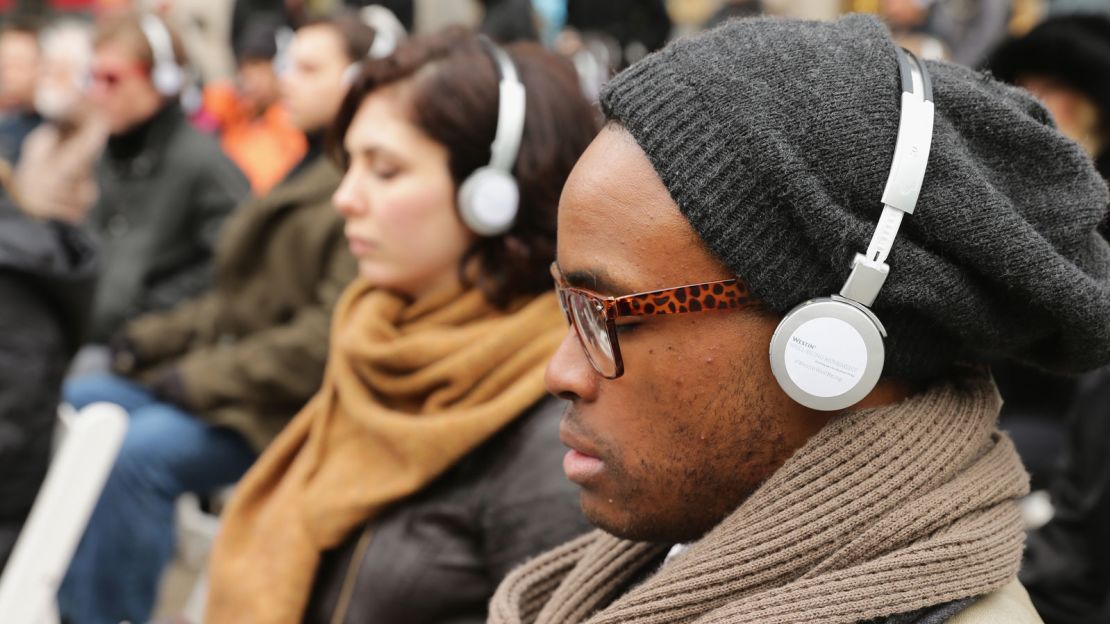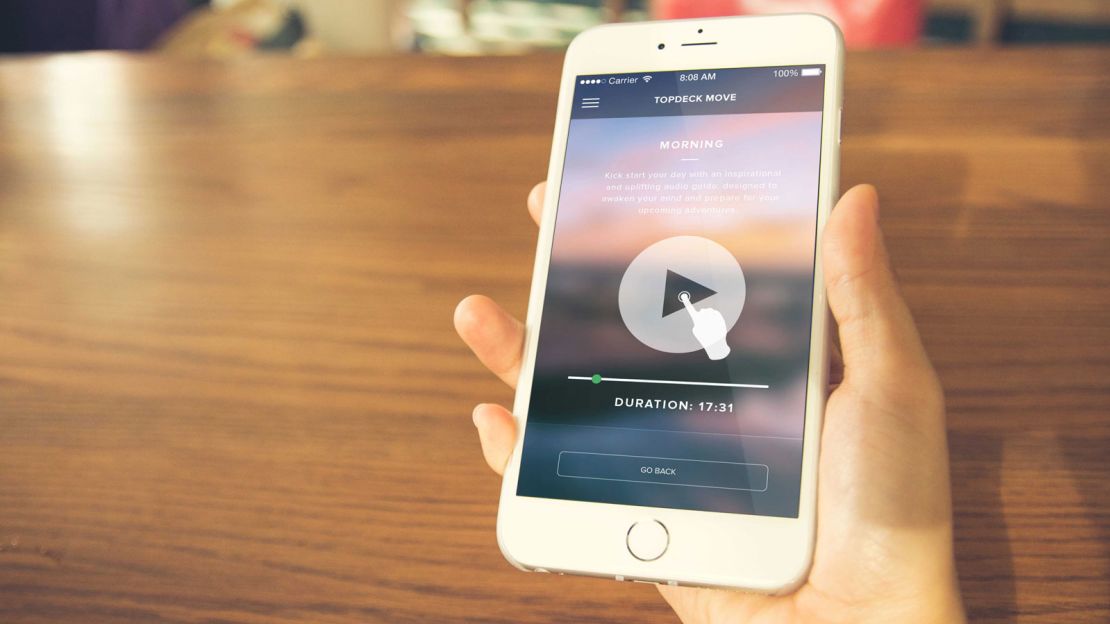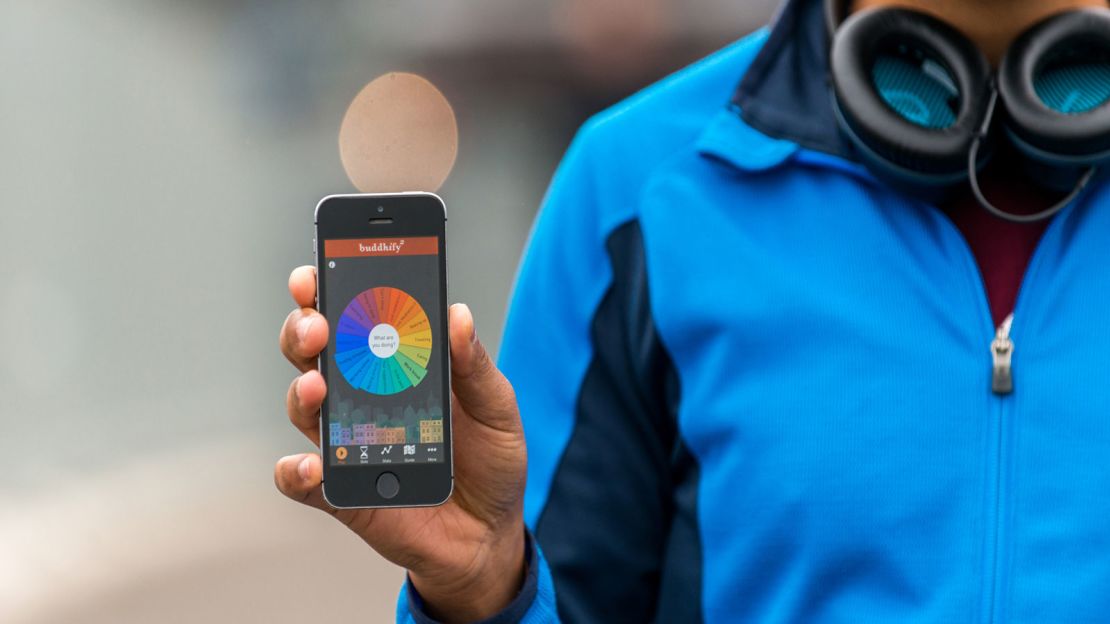Story highlights
Meditation apps are designed to help users remain mindful in stressful situations
Apps such as Headspace and Buddhify offer meditations catered to travel
The app creators want to bring meditation to the masses
Traveling: It should be a chance to unwind, but often it just winds you up.
From canceled flights to tube strikes to lost luggage, plenty of potential in-transit problems threaten to disrupt your Zen.
Even if your journey is hassle-free, in today’s age of hyper-connectivity it’s hard to focus on the now.
How can you forget your work woes if your phone is buzzing every five minutes?
How can you appreciate the beauty of your new locale if you’re just viewing it through an Instagram filter?
What is mindfulness?
Mindfulness has become an omnipresent buzzword: from the burgeoning adult coloring book market to the growth of yoga as the exercise class du jour.
The art of mindfulness is defined as living in the present – arguably the most rewarding thing about being on vacation.
Advocates say that practicing mindfulness on trips away can allow you to remain calm in the face of unexpected turbulence – both literal and metaphorical.
Jamie Bristow, director of the Mindfulness Initiative and a consultant to the Oxford Mindfulness Centre (OMC), champions this link between mindfulness and travel.
“One of the things people often say mindfulness helps them with is being comfortable when they are uncomfortable,” says Bristow.
“Practicing mindfulness allows long queues, long-haul flights to be manageable.
“Rather than being very distressed you’re more able to […] see the best in the situation, to step out of the difficult thought patterns.”
7 new travel start-ups making business trips less stressful
OMC
At the Oxford Mindfulness Centre (OMC), founded in 2008 as part of Oxford University’s Department of Psychiatry, a team of professionals conducts regular research into the potential benefits of using mindfulness to deal with depression and memory loss.
The OMC has its own YouTube Channel, which features free guided meditation videos.
The app pack
Bristow is in the process of designing an OMC app.
Meanwhile, a quick search on iTunes proves that mindfulness apps have become ubiquitous.
I’m a curious skeptic when it comes to mindfulness. I find traveling occasionally stressful and wonder if these apps could be the answer.
I decide to test three mindfulness apps during my daily commute.
Traveling to London on the 7:02 a.m. train isn’t exactly a vacation in an exciting locale, but many of the same stresses abound: delayed trains, busy stations and long queues.

First up is Headspace.
Widely regarded as the leader of the app pack, Headspace is a self-described “gym membership for the mind.”
Users can enjoy a free 10-day starter program featuring the basics of meditation in 10-minute chunks. The most popular subscription is annual, at £4.99 ($7.99) a month.
Headspace counts Emma Watson amongst its high-profile fans: on Twitter the “Harry Potter” actress called the app “kind of genius.”
Andy Puddicombe, Headspace’s inventor, dropped out of university to become a Buddhist monk.
Ten years later, he dreamed up Headspace as a way of making meditation universally accessible.
How young is too young to travel?
Taking 10 on the commute
I test Headspace’s first Take10 session on my commute home from work.
I begin the exercise distracted, but as Andy’s voice guides me through simple breathing exercises, the inhaling and exhaling give me something new to concentrate on.
My internal monologue slowly fades to mute.
Ten minutes later, exercise complete, I open my eyes. I feel considerably calmer than I did before.

My next app hails from youth travel company, Topdeck Travel.
Topdeck recently launched a new addition to their eponymous travel app.
Entitled “Move,” it provides bespoke, travel-themed meditations from meditation expert Biet Simkin.
“Nothing makes the experience of traveling easier and more fluid than meditation,” explains Simkin.
“Traveling can be a full-on experience, absorbing new cultures and meeting new people.
“Of course, it’s worth it – that’s why we travel, to understand more about the world we live in. Meditation provides a state of ease and acceptance.”
Simkin recorded three meditations for Topdeck: “Morning,” “Drive” and “Night.”
I select “Morning.” Biet’s soothing voice soon fills my headphones, accompanied by atmospheric music.
Like Headspace, this app concentrates on breathing.
Unlike its competitor, however, Topdeck’s meditations create a dreamier, yogi-esque ambiance.
I don’t mind it, but it won’t appeal to everyone.
Later in the day, however, I test out “Drive,” which is similar but more accessible.
I enjoy its emphasis on visualization and detachment from active thinking.
Travel booking site gives yoga a new twist

Finally, I conclude my experiment with Buddhify.
Their app interface is my favorite: a colorful pie chart that allows you to answer the question “What are you doing?” and then choose a track accordingly.
The options range from “Being Online” and “Walking in a City” to “Traveling.” The app, designed for city dwellers, seems perfect for my commuter lifestyle.
I test out Buddhify’s “Flex,” an effective, travel-themed meditation designed for use in a busy, loud place.
The track designates “movement, sound, sight and thought” as the four main categories of travel experience and guides the listener through coping with these sensations.
Buddhify uses different voices for different meditations.
Tracks also range in length, so you can adjust your chosen meditations depending on your current activity.
You can also rate how mindful you feel after each meditation and track your progress accordingly.
Making traveling more valuable
I conclude the week considerably more relaxed than when I started.
Am I a mindful convert? Not completely.
Some days I look forward to my in-transit meditations, other days I would rather read a book or download a film.
The apps are particularly appealing – and effective – on days when I’m feeling stressed.
I haven’t deleted any of them and continue to experiment with the three.
Buddhify app creator Rohan Gunatillake explains that practicing mindfulness whilst traveling is key because “few of us have the luxury of lots of quiet and calm time for formal sitting meditation but since many of us spend so much time traveling […] a few minutes meditating while traveling can be just as valuable as the same amount of time in more traditional meditation.”
Therein lies the appeal of meditating while traveling: rendering the unavoidable process of getting from A to B an easier, more enjoyable and more valuable experience.
Headspace: Ten-day free trial, monthly ($12.95 or £7.95/month), yearly ($7.99 or £4.99/month), two-year and lifetime subscriptions are available. Available iOS and Android.
Buddhify: One-off payment of $4.99 (£3.99) for iOS and $2.99 (£1.99) for Android.
Topdeck: Free but Topdeck booking reference needed. Available for iOS and Android.
What are the world’s happiest countries in 2017?





